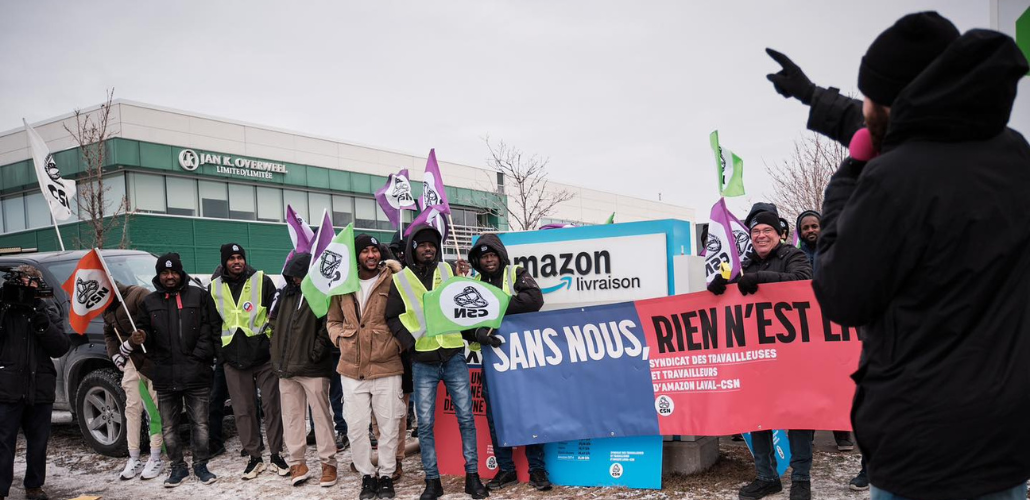Amazon Lays off 4,500 Workers in Quebec to Bust Their Union

Rather than accept a union contract, which an arbitrator could ultimately have imposed, Amazon is outsourcing its entire warehouse and delivery operation in Quebec. The sign indicates this is a delivery facility and the workers' banner reads, "Without us, nothing is delivered." Photo: CSN
Faced with the prospect of being forced to sign a labor contract as early as this summer, Amazon has gone to extreme lengths to evade its obligations under Quebec’s labor code. On January 22, it announced it is closing all seven of its warehouses in Quebec and outsourcing their operations.
Is Amazon closing shop? Not really. It will continue selling its wares online in Quebec; It’s just that warehousing and delivery will now be handled by third-party contractors.
But the 4,700 layoffs are very real: 1,900 Amazon employees across the seven warehouses are losing their jobs, including the 230 workers at DXT4, which became the first Amazon facility in Canada to unionize in May 2024. An additional 2,800 workers employed by Amazon’s delivery subcontractors are also being laid off.
Amazon was quick to deny that this was an anti-union move in any way. However, Quebec is the only jurisdiction in North America where Amazon is introducing this new outsourcing business model, despite the fact that it has been firmly established in Quebec since 2020 and indeed became the top online retailer in the province during the pandemic.
The Confédération des syndicats nationaux (Federation of National Unions, CSN), one of Canada’s largest labor federations with 330,000 members, believes the picture is clear: the purpose of Amazon’s ruthless move is to block the signing of its first collective bargaining agreement in North America at all costs and to set a precedent that will stifle any organizing efforts elsewhere. That makes it illegal under Quebec law, which prohibits employers from interfering with union activities.
The CSN is determined to hold Amazon accountable. On February 4, it launched a nationwide boycott campaign. It is urging the public, the federal and provincial governments, municipalities, and public agencies to stop buying from Amazon and to cancel existing contracts, including for cloud services.
At the same time, the CSN announced plans to take legal action in the coming days. It will seek a court order to overturn the mass layoffs, reopen the seven warehouses, and reinstate Amazon’s 1,900 direct employees.
A PATTERN OF FEARMONGERING
A few months after Amazon opened its first facility in Quebec, the YUL2 warehouse in Lachine near the Montreal airport, workers there contacted the CSN about forming a union. Their grievances were familiar: the grueling pace of work, the high rates of workplace accidents and injuries, the precarious employment conditions for the contract workers, and low wages. They were earning $20 Canadian per hour (about $14 U.S.), far below the average $28 wage at warehouses with CSN unions.
However, the CSN couldn’t get a majority of the workers at YUL2 to sign a union card, probably because of a ferocious anti-union campaign waged by warehouse management. Starting in May 2023, employees couldn’t take a break, eat lunch, or go to the bathroom without encountering anti-union posters plastered on the walls. “Protect your signature” advised some of the Amazon posters, a message calculated to unnerve Amazon’s immigrant workers, many of whom have precarious status in Canada.

SUPPORT LABOR NOTES
BECOME A MONTHLY DONOR
Give $10 a month or more and get our "Fight the Boss, Build the Union" T-shirt.
This is illegal under sections 12 to 15 of Quebec’s labor code, which prohibit employers from hindering the activities of an association of employees or intimidating employees who want to join one.
The CSN took Amazon to court, arguing that its posters were intended to intimidate. In July 2024, Quebec’s labor tribunal ruled in the union’s favor and ordered Amazon to remove and destroy all the anti-union materials. Judge Henrik Ellefsen found that the messages “constitute warnings to employees about sensitive issues and are clearly likely to alarm them about the possible consequences of joining a union.” Amazon was also ordered to pay the union $30,000 in moral and punitive damages.
The same anti-union messages went up at other Amazon warehouses in Quebec where the CSN was organizing.
CANADA’S FIRST AMAZON UNION
But at Amazon’s DXT4 warehouse in the Montreal suburb of Laval, the posters didn’t go up until the day after the CSN filed for union certification, when it was too late. A few days later, after verifying the signed union cards, the labor tribunal determined that the union had majority support among the 230 employees. On May 10, 2024, the first—and so far only—Amazon union in Canada was certified.
In July 2024, Amazon and the union sat down at the bargaining table. They were soon joined by a ministry of labor mediator, at the union’s request. In December, the mediator told the parties that if there was no movement on either side, he would have to report to the labor minister that the talks were deadlocked.
Under Quebec labor law, that is the first step toward binding arbitration. If a government mediator declares bargaining for a first collective bargaining agreement at an impasse, either party can request arbitration and an administrative judge will then decide the points in dispute.
Amazon’s negotiators were aware that the CSN was about to file for first contract arbitration, which meant it could have been forced to sign a collective bargaining agreement as early as this summer.
So Amazon decided to slash and burn rather than accept its first labor contract in North America. What do 4,700 jobs matter when the business model that has made Jeff Bezos one of the richest men in the world is under threat?
François L’Écuyer works for the Confédération des syndicats nationaux (Federation of National Unions, CSN).





